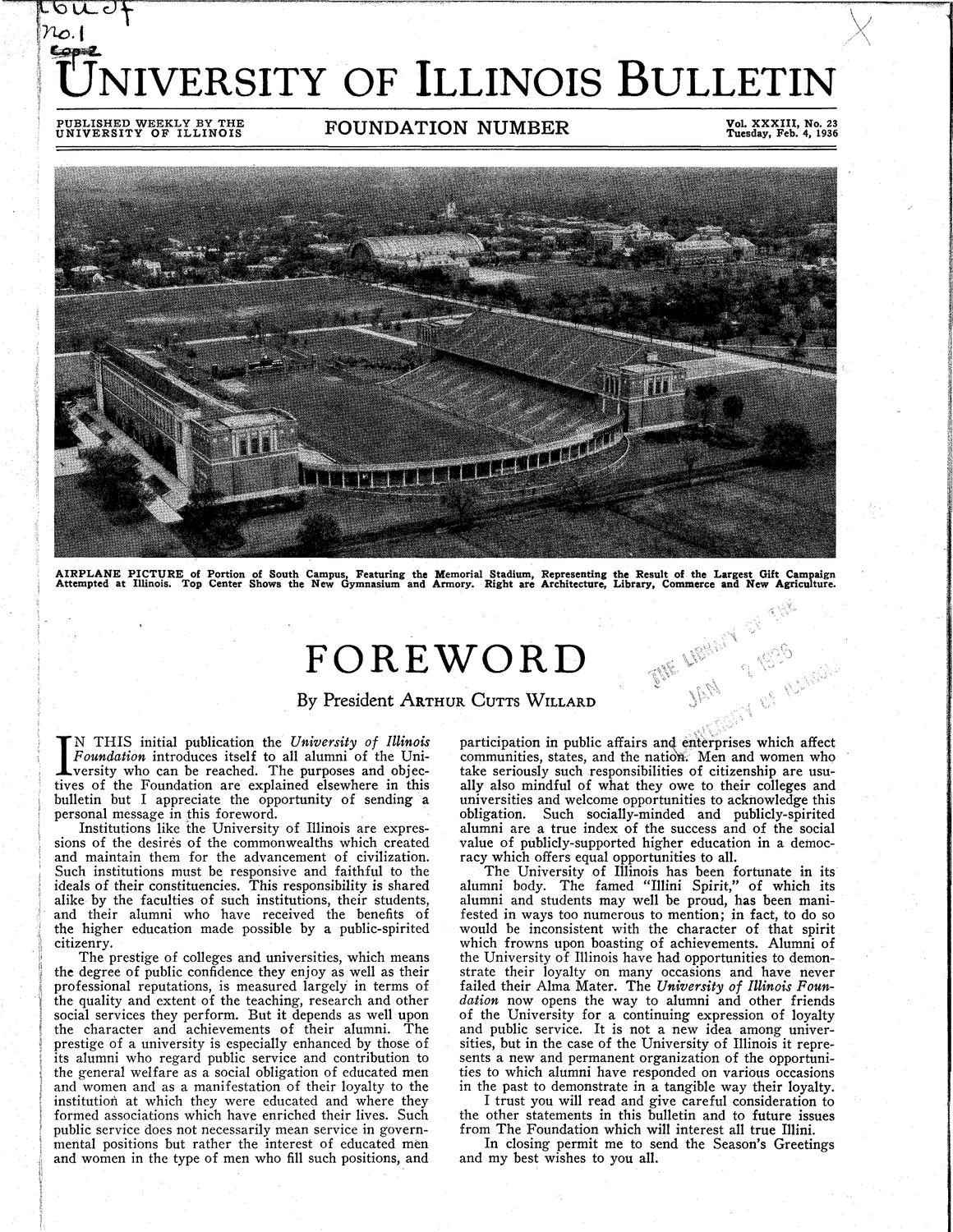| |
| |
Caption: UI Foundation Series - Bulletin 1 (1936)
This is a reduced-resolution page image for fast online browsing.

EXTRACTED TEXT FROM PAGE:
UNIVERSITY OF ILLINOIS BULLETIN P U B L I S H E D WEEKLY BY T H E U N I V E R S I T Y OF I L L I N O I S FOUNDATION NUMBER Vol. X X X I I I , No. 23 Tuesday, Feb. 4, 1936 AIRPLANE PICTURE of Portion of South Campus, Featuring the Memorial Stadium, Representing the Result of the Largest Gift Campaign Attempted at Illinois. Top Center Shows the New Gymnasium and Armory. Right are Architecture, Library, Commerce and New Agriculture. FOREWORD By President ARTHUR CUTTS WILLARD participation in public affairs and enterprises which affect communities, states, and the nation. Men and women who take seriously such responsibilities of citizenship are usually also mindful of what they owe to their colleges and universities and welcome opportunities to acknowledge this obligation. Such socially-minded and publicly-spirited alumni are a true index of the success and of the social value of publicly-supported higher education in a democracy which offers equal opportunities to all. The University of Illinois has been fortunate in its alumni body. The famed "Illini Spirit," of which its alumni and students may well be proud, has been manifested in ways too numerous to mention; in fact, to do so would be inconsistent with the character of that spirit which frowns upon boasting of achievements. Alumni of the University of Illinois have had opportunities to demonstrate their loyalty on many occasions and have never failed their Alma Mater. The University of Illinois Foundation now opens the way to alumni and other friends of the University for a continuing expression of loyalty and public service. It is not a new idea among universities, but in the case of the University of Illinois it represents a new and permanent organization of the opportunities to which alumni have responded on various occasions in the past to demonstrate in a tangible way their loyalty. I trust you will read and give careful consideration to the other statements in this bulletin and to future issues from The Foundation which will interest all true Illini. In closing permit me to send the Season's Greetings and my best wishes to you all. N T H I S initial publication the University of Illinois Foundation introduces itself to all alumni of the University who can be reached. The purposes and objectives of the Foundation are explained elsewhere in this bulletin but I appreciate the opportunity of sending a personal message in this foreword. Institutions like the University of Illinois are expressions of the desires of the commonwealths which created and maintain them for the advancement of civilization. Such institutions must be responsive and faithful to the ideals of their constituencies. This responsibility is shared alike by the faculties of such institutions, their students, and their alumni who have received the benefits of the higher education made possible by a public-spirited citizenry. The prestige of colleges and universities, which means the degree of public confidence they enjoy as well as their professional reputations, is measured largely in terms of the quality and extent of the teaching, research and other social services they perform. But it depends as well upon the character and achievements of their alumni. The prestige of a university is especially enhanced by those of its alumni who regard public service and contribution to the general welfare as a social obligation of educated men and women and as a manifestation of their loyalty to the institution at which they were educated and where they formed associations which have enriched their lives. Such public service does not necessarily mean service in governmental positions but rather the interest of educated men and women in the type of men who fill such positions, and I
| |